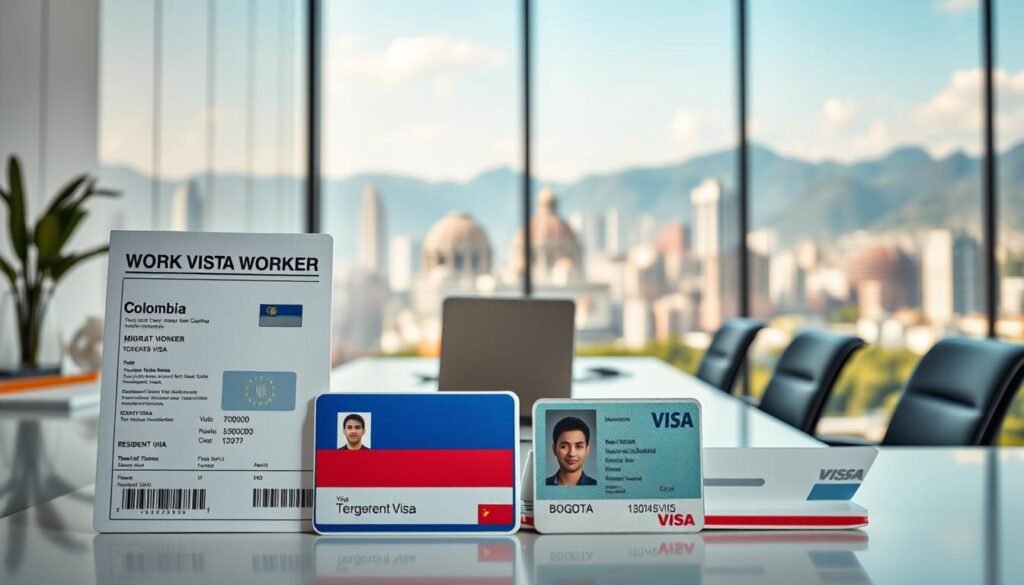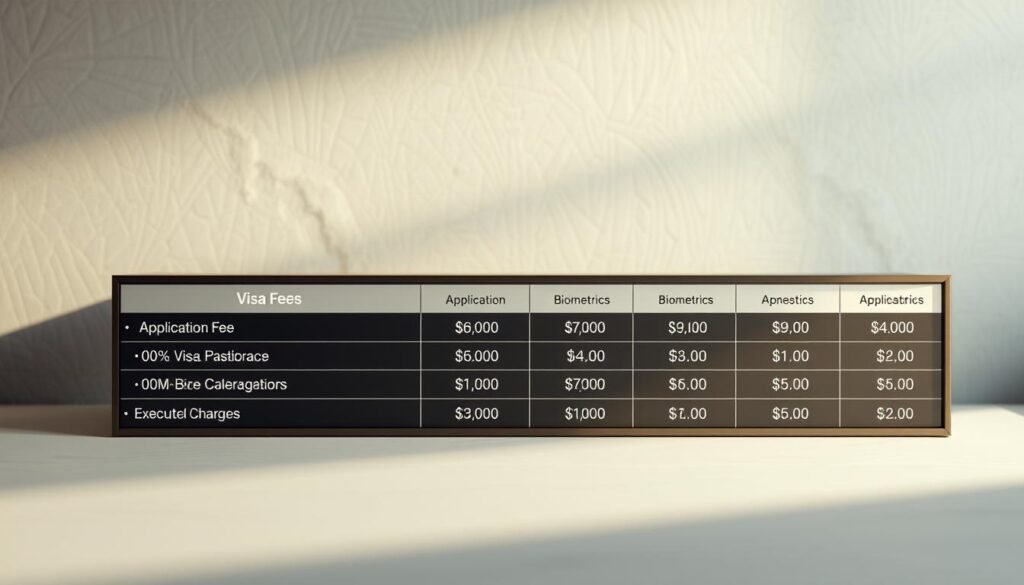Have you ever wondered what it takes to navigate the complexities of securing a visa for executive roles? Understanding the fees, requirements, and timelines is crucial for a smooth immigration process. This guide provides a detailed breakdown to help you plan effectively.
From the initial application to final approval, each step demands careful attention. Whether you’re an employer or an applicant, knowing the specifics of the visa category you’re applying for can save time and resources. Premium processing options are also available for those needing faster results.
Our guide uses real data from U.S. and Colombian sources to ensure accuracy. It covers everything from documentation to labor requirements, making it a valuable resource for executives and their teams.
Key Takeaways
- Understand the fees and requirements for executive visas.
- Learn about the application process and necessary documents.
- Explore premium processing options for faster results.
- Gain insights into approval timelines and immigration laws.
- Use real data to plan your visa strategy effectively.
Understanding the Work Visa Landscape in Colombia
Colombia offers diverse visa options tailored to different professional and personal needs. Whether you’re an executive relocating for business or an individual seeking long-term residency, understanding the visa categories and eligibility criteria is crucial. This section provides a detailed overview to help you navigate the process effectively.

Visa Categories and Eligibility
Colombia’s visa system includes several categories, each designed for specific purposes. The Migrant Visa is ideal for those planning to stay for up to three years, while the Resident Visa offers a five-year term for permanent residency. For executives, the Business Visa is particularly relevant, allowing them to engage in commercial activities.
Eligibility requirements vary by visa type. For instance, the Pension Visa requires proof of a monthly income at least three times the Colombian minimum wage. Similarly, the Investment Visa demands a minimum capital investment of 100 times the minimum wage. Understanding these criteria ensures a smoother application process.
How Regulations Impact Executives
Colombian immigration laws play a significant role in shaping the visa application journey for executives. Local regulations often require employers to provide detailed documentation, including job offers and proof of business activities. Additionally, executives must ensure compliance with labor laws, such as minimum wage and working hour standards.
Compared to the U.S. system, Colombia’s visa process emphasizes local integration. For example, Migrant Visa holders must visit Colombia at least once every 180 days to maintain their status. This requirement highlights the importance of understanding both the legal and practical aspects of relocation.
Work Visa Costs and Processing Times for Executives
Planning for visa-related expenses and timelines is a critical step for international assignments. Understanding the financial and time commitments involved ensures a smoother transition for executives and their employers. This section provides a detailed breakdown of fees and processing durations to help you prepare effectively.
Breakdown of Visa Fees and Expenses
Securing a visa involves several costs, including filing fees, legal fees, and additional charges. For example, the M Visa costs $230, while the V Visa is priced at $170. These fees cover the initial application and processing stages.
Additional expenses may include legal support, documentation preparation, and consular fees. Employers should also account for potential premium processing options, which can expedite the approval process for an extra fee.

- Filing fees: $230 for M Visa, $170 for V Visa
- Legal fees: Varies based on case complexity
- Premium processing: Additional $1,440 for faster results
Insights on Processing Timelines
Processing times vary depending on the visa category and the country of application. In the U.S., standard processing can take 15-30 business days, while premium processing guarantees a response within 15 calendar days.
In Colombia, the timeline ranges from one to two months, depending on the documentation and the type of visa. Delays can occur due to incomplete applications or high application volumes.
Factors influencing processing times include:
- Completeness of the application
- Volume of applications at the consulate
- Use of expedited services
By understanding these factors, employers and applicants can better plan their timelines and avoid unnecessary delays.
Key Requirements and Documentation Essentials
Accurate documentation and clear responsibilities are critical for successful visa applications. Gathering the right paperwork and understanding roles can simplify the process and prevent delays. This section outlines the essential documents and the responsibilities of both employers and employees.

Essential Documents for Visa Applications
Preparing the correct paperwork is the first step in the visa process. Below is a list of key documents required for most applications:
- Passport: Must be valid for at least six months beyond the intended stay.
- Employment Contract: A signed agreement detailing the job role, salary, and duration.
- Qualifications Proof: Diplomas, certificates, or transcripts demonstrating relevant experience.
- Civil Documents: Birth certificates, marriage certificates, or other legal papers.
In some cases, documents may need translation and certification. Ensure all paperwork is accurate and up-to-date to avoid rejections.
Employer and Employee Responsibilities
Both parties play a vital role in the visa process. Employers must provide detailed job offers and ensure compliance with immigration laws. Employees are responsible for submitting accurate forms and supporting evidence.
Here’s a breakdown of their responsibilities:
| Employer Responsibilities | Employee Responsibilities |
|---|---|
| Submit a job offer with detailed terms. | Complete the application form accurately. |
| Ensure compliance with labor laws. | Provide proof of qualifications and experience. |
| Support the employee with legal documentation. | Submit civil documents and passport copies. |
Maintaining organized documentation and adhering to timelines ensures a smooth application process. Both parties must work together to meet legal and compliance standards.
The Step-by-Step Work Visa Application Process
Navigating the visa application process can seem daunting, but breaking it into clear steps makes it manageable. From gathering documents to scheduling interviews, each phase requires careful attention to detail. This guide walks you through the essential stages to ensure a smooth experience.
Gathering and Submitting Your Application
The first step is securing a job offer from a Colombian employer. This offer serves as the foundation for your application. Once obtained, you’ll need to assemble the necessary documentation, including your passport, employment contract, and proof of qualifications.
Next, complete the online application form. Ensure all fields are filled accurately to avoid delays. After submission, pay the required fee through the designated payment portal. Keep a receipt for your records.

Common pitfalls include incomplete forms or missing documents. Double-check everything before submitting. As one expert notes,
«Attention to detail is the key to avoiding unnecessary delays.»
Scheduling Interviews and Medical Examinations
Once your application is submitted, you’ll receive instructions to schedule a consular interview. This step is crucial for verifying your eligibility and immigration status. Prepare by reviewing your application and bringing all required evidence.
Medical examinations are often mandatory. Schedule these with an approved clinic and ensure all results are submitted promptly. Delays in this step can push back your approval timeline.
Here’s a quick checklist to keep you on track:
- Secure a valid job offer.
- Gather and submit all required documents.
- Pay the application fee.
- Schedule and attend the consular interview.
- Complete the medical examination.
By following these steps, you can navigate the process efficiently and minimize potential setbacks.
Premium Processing and Expedited Options
For executives seeking faster visa approvals, premium processing offers a valuable solution. This service ensures quicker decisions, often critical for business timelines. Understanding its benefits and when to use it can make a significant difference in your immigration journey.
Understanding Premium Processing Benefits
Premium processing is a service that expedites the review of your application. In the U.S., it guarantees a response within 15 business days for an additional fee of $2,805. This option is ideal for those who need to meet tight deadlines or start their employment quickly.
Key benefits include:
- Faster decision-making, reducing uncertainty.
- Priority handling of your application.
- Peace of mind for both employers and employees.
When and How to Opt for Expedited Services
Expedited processing is recommended in specific scenarios. For instance, if your job start date is approaching or your current status is expiring, this service can be a lifesaver. In Colombia, expedited options are also available, though timelines and fees may vary.
Here’s a comparison of premium processing in the U.S. and Colombia:
| Country | Fee | Processing Time |
|---|---|---|
| United States | $2,805 | 15 business days |
| Colombia | Varies | 1-2 months |
To request premium processing, submit the required form and pay the additional fee. Ensure all documentation is complete to avoid delays. This step is particularly useful for executives managing complex business schedules.
Employer Sponsorship and Financial Obligations
Employers play a pivotal role in facilitating the immigration journey for international talent. From securing the necessary documentation to managing financial obligations, their responsibilities are extensive. This section outlines the key steps and costs involved in sponsoring a visa application.
Sponsorship Documentation and Legal Requirements
Sponsoring an employee requires meticulous preparation. Employers must submit a job offer and ensure compliance with local immigration laws. Essential documents include the employment contract, proof of the company’s legal status, and evidence of the employee’s qualifications.
In the U.S., employers must file a Labor Condition Application (LCA) to confirm fair wages and working conditions. In Colombia, similar labor certifications are required. These steps ensure transparency and protect both parties.
Tracking and Managing Costs
Sponsorship involves various fees, including filing, legal, and premium processing charges. For example, the H-1B petition fee ranges from $460 to $780, while the fraud prevention fee is $500. Employers should budget for these expenses to avoid financial strain.
Here’s a breakdown of typical costs:
- Filing fees: $460 to $780 (H-1B petition).
- Fraud prevention fee: $500 (mandatory for certain visa categories).
- Premium processing: $2,805 (optional for faster approval).
Effective cost management includes tracking expenses and planning for renewals. Employers should also consider additional costs like relocation and settlement support.
By understanding these responsibilities, employers can ensure a smooth immigration process for their international hires. Compliance with labor laws and accurate documentation are essential for long-term success.
Comparative Insights: US Versus Colombian Visa Processes
Understanding the nuances of visa processes across countries can significantly impact executive relocation decisions. The U. S. and Colombia offer distinct pathways, each with its own set of requirements, fees, and timelines. This section provides a detailed comparison to help executives choose the best path forward. For executives seeking international relocation, navigating these differences is crucial to ensuring a smooth transition. The fastest work visas for executives often depend on factors such as processing efficiency, eligibility criteria, and governmental policies. By comparing these elements, executives can make informed decisions that align with their professional timelines and business objectives.
Differences in Application Procedures
The U.S. and Colombian visa systems differ in their procedural steps. In the U.S., executives often start with a job offer and proceed to file a petition with USCIS. This is followed by a consular interview and medical examination.
In Colombia, the process emphasizes local integration. Applicants must submit a job offer and visit the country periodically to maintain their status. The documentation requirements also vary, with Colombia often requiring additional proof of local ties.
| Step | United States | Colombia |
|---|---|---|
| Initial Application | File a petition with USCIS | Submit job offer and local documentation |
| Consular Interview | Mandatory for most visa types | Required for certain categories |
| Medical Examination | Required for long-term visas | Optional for some visa types |
Cost and Timeline Comparisons
The fees and processing times vary significantly between the two countries. In the U.S., the H-1B visa costs $460 to $780, with premium processing available for $2,805. In Colombia, the fee structure is more flexible, often depending on the visa category.
Processing times also differ. The U.S. offers expedited services with a 15-day turnaround, while Colombia typically takes one to two months. Here’s a breakdown:
- United States: 15-30 business days (standard), 15 days (premium).
- Colombia: 1-2 months (standard), no premium option.
Local regulations play a significant role in shaping these timelines. For example, Colombia’s emphasis on local integration often extends the process, while the U.S. focuses on immigration compliance.
Common Challenges and Strategies for a Smooth Application
The visa application process often presents unique challenges that require careful planning. From bureaucratic hurdles to documentation errors, these obstacles can delay approvals and create unnecessary stress. Understanding these challenges and implementing effective strategies can make the process smoother and more efficient.
Navigating Bureaucratic Hurdles
Bureaucratic delays are a common issue in the immigration process. Incomplete forms, missing documents, or misinterpreted requirements can lead to significant setbacks. For example, nearly 30% of applications are delayed due to incomplete submissions.
To avoid these issues, double-check all documentation before submission. Ensure that forms are filled accurately and that all supporting evidence is included. Engaging a professional consultant can also help navigate complex requirements and reduce the risk of errors.
Tips for Accurate and Timely Submissions
Early preparation is key to a successful application. Start gathering documents well in advance and review all requirements carefully. Here are some actionable tips:
- Verify the validity of your passport and other identification documents.
- Ensure your job offer and employment contract meet local labor standards.
- Schedule interviews and medical examinations promptly to avoid delays.
Misinterpretations of document requirements are another common issue. For instance, some applicants fail to provide translated or certified copies of their papers. Always confirm the specific requirements for your visa category.
| Challenge | Strategy |
|---|---|
| Incomplete Forms | Double-check all fields before submission. |
| Missing Documents | Create a checklist of required documentation. |
| Bureaucratic Delays | Engage professional support for guidance. |
By following these strategies, you can minimize delays and ensure a smoother process. Staying informed and proactive is essential for navigating the complexities of immigration.
Future Trends and Regulatory Changes Impacting Visas
The immigration landscape is constantly evolving, and staying ahead of regulatory changes is crucial for executives. Anticipating future trends in visa policies can help mitigate potential challenges and ensure a smooth transition for international assignments. This section explores upcoming shifts and provides actionable advice to navigate this dynamic environment.
Upcoming Policy Shifts
Recent discussions in both the U.S. and Colombia suggest significant changes in immigration policies. For instance, the U.S. has proposed adjustments to fee structures and processing timelines. In Colombia, there is a growing emphasis on local integration, which may impact visa requirements for executives.
One notable example is the proposed wage rule in the U.S., which aimed to increase earning thresholds for certain visa categories. Although this rule was overturned, it highlights the potential for future adjustments. Similarly, Colombia’s focus on labor certifications underscores the importance of compliance with local laws.
Preparing for a Dynamic Immigration Landscape
To stay ahead, executives and employers must adopt proactive strategies. Monitoring immigration news and engaging with legal experts can provide valuable insights. For example, tracking changes in fee structures or processing times can help businesses plan effectively.
Here are some actionable steps to prepare for future changes:
- Regularly review updates from immigration authorities in both the U.S. and Colombia.
- Maintain organized documentation to expedite application processes.
- Consider alternative visa categories if primary options become less viable.
By staying informed and adaptable, executives can navigate the complexities of a shifting immigration landscape with confidence.
Legal and Financial Planning for International Executives
Navigating the legal and financial aspects of international relocation requires careful planning. From understanding fee structures to complying with immigration laws, executives must be well-prepared to avoid costly mistakes. This section provides actionable insights to help you manage these complexities effectively.
Why Consulting Legal Experts is Essential
Immigration laws can be complex and vary significantly between countries. In the U.S., for example, the EB-5 Immigrant Investor Program requires a minimum investment of $800,000 and the creation of 10 full-time jobs. In Colombia, local integration rules may demand periodic visits to maintain status.
Consulting an immigration attorney ensures compliance with these requirements. Legal experts can also help navigate unexpected challenges, such as changes in fee regulations or documentation errors. As one expert notes,
«Professional legal support is invaluable for complex visa applications.»
Budgeting for Long-Term Visa Costs
Beyond initial fees, executives must account for long-term financial commitments. These include legal support, documentation preparation, and potential premium processing options. For instance, the U.S. H-1B petition fee ranges from $460 to $780, while Colombia’s visa costs vary by category.
Here’s a breakdown of typical expenses:
| Expense | United States | Colombia |
|---|---|---|
| Filing Fees | $460 – $780 | Varies by category |
| Legal Support | $2,000 – $5,000 | $1,500 – $3,000 |
| Premium Processing | $2,805 | Not available |
To manage these costs, create a detailed budget and allocate funds for unexpected expenses. Regularly review updates from immigration authorities to stay informed about potential changes.
By aligning financial planning with immigration goals, executives can ensure a smoother transition and avoid unnecessary delays. Professional support and strategic budgeting are key to success in this process.
Practical Advice for Navigating Immigration and Employment
Relocating internationally as an executive involves more than just packing bags; it requires strategic planning and understanding of local regulations. To ensure a smooth transition, it’s essential to address cultural, logistical, and legal challenges effectively. Here’s how to navigate this complex process with confidence.
Strategies for Executive Relocation
One of the first steps is to work with local experts who understand the immigration and employment landscape. These professionals can provide insights into visa requirements, documentation, and compliance with local laws. For example, in Colombia, integrating into the local culture is often a key requirement for maintaining status.
Another critical strategy is to create a detailed relocation checklist. This should include:
- Securing a valid job offer and employment contract.
- Gathering necessary documents, such as passport copies and proof of qualifications.
- Understanding the fee structure and processing times for your visa category.
Ensuring a Seamless Transition
To minimize disruptions, executives should focus on transferring their benefits and support systems. This includes healthcare, housing, and financial services. Working with employer of record solutions can simplify payroll and compliance matters, ensuring a smooth transition into the new role.
Cultural adaptation is equally important. Engaging with local communities and understanding business etiquette can help build strong professional relationships. As one expert notes,
«Cultural integration is not just about fitting in; it’s about thriving in a new environment.»
Finally, staying informed about regulatory changes is crucial. For instance, the termination of Temporary Protected Status (TPS) for Venezuelans in 2025 highlights the need for proactive planning. By anticipating such shifts, executives can avoid last-minute complications.
By following these strategies, executives can navigate the complexities of international relocation with ease. Proper planning and professional support are key to ensuring a successful transition.
Final Insights on Securing Executive Work Visas in Colombia
Securing the right immigration pathway for business roles in Colombia demands careful planning and strategic insights. Understanding the fee structure, application process, and local requirements is essential for a smooth transition. This guide has outlined the key steps, from gathering documents to navigating legal obligations, ensuring you’re well-prepared for the journey ahead.
Proactive planning is crucial. Whether you’re an employer or an applicant, staying informed about immigration policies and timelines can save time and resources. Engaging professional support ensures compliance with local laws and minimizes potential delays.
Finally, remember that each visa category has unique requirements and benefits. By following the strategies outlined here, you can confidently navigate the process and achieve your international goals. For further assistance, consult trusted resources or legal experts to ensure a seamless experience.
